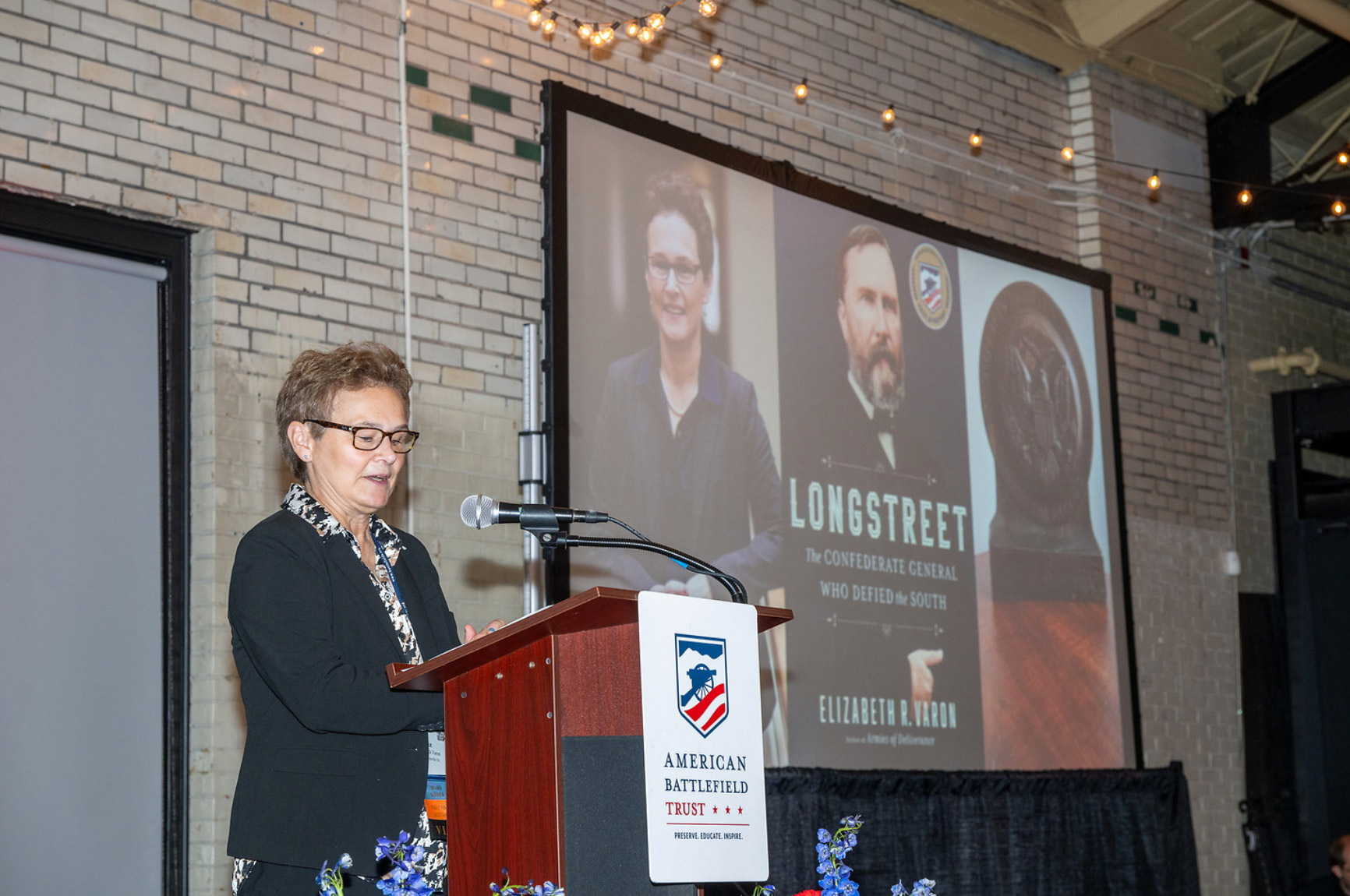
James Longstreet
The following is an excerpt from the inaugural winner of the American Battlefield Trust’s Prize for History: Longstreet: The Confederate General Who Defied the South by Elizabeth Varon.
After the Civil War, former Confederate Gen. James Longstreet and his family moved to New Orleans, where Longstreet formed a cotton-brokerage partnership and became president of the Southern and Western Life and Accident Insurance Company. According to many he would always be considered, “Rebel Number 3.” But his actions in New Orleans would soon make him an outcast in the South.
Longstreet was widely “loved and venerated” by whites in New Orleans, both as a “famous warrior” and one of the city’s “most influential merchants,” as the local press put it. Nothing he had said or done in his life had prepared the public for what came next.
In March, April, and June 1867 Longstreet published four letters expressing his support for the newly announced program of congressional Reconstruction. Congress’s Reconstruction Acts were a dramatic turning point in the nation’s history; they were also a crossroads for Longstreet, who in the spring of 1867 very consciously chose a different path than most former Confederates.
Longstreet’s letters changed the course of his life forever….
His new course was charted in March 1867 when a prominent New Orleans Democratic newspaper, the Times, solicited the view of the city’s leading citizens on the dominant question in Southern politics: Should former rebels comply with Congress’s new Reconstruction program, or should they resist it? On March 18, Longstreet wrote to the New Orleans Times the following: “There can be no discredit to a conquered people for accepting the conditions offered by their conquerors. Nor is there any occasion for a feeling of humiliation. We have made an honest, and I hope that I may say, a creditable fight, but we have lost. Let us come forward, then, and accept the ends involved in the struggle. Let us accept the terms, as we are in duty bound to do.”
Longstreet developed this theme in a second letter to the New Orleans Times, on April 6. Again he spoke of the need to accept defeat, only this time he enumerated what exactly he felt Confederates had staked in the war and lost: “The surrender of the Confederates armies in 1865 involved,
1. The surrender of the claim to the right of secession. 2. The surrender of the former political relations of the negro. 3. The surrender of the Southern Confederacy.” The South’s duty, as he put it, was to “speed the work of reconstruction and put our people [in a] condition to make their own laws.” He acknowledged the prevailing Southern opinion that “we cannot do wrong, and that Northerners cannot do right.” But he urged that “each should extend charity if they expect it in return.”
Among former Confederates, reactions to Longstreet’s initial letters were muted; his sterling military reputation gave him the benefit of the doubt. As the Richmond Dispatch put it, military commanders were “presumed to be men of chivalry and honor” and “practical in all cases.” Longstreet, it seemed, was simply advising the South to face reality: it no longer had the power to fight and so must “frankly and manfully” conform to the law. Longstreet’s letters were interpreted as a plea that Southerners assert themselves in Reconstruction politics in order to “make the best of a bad bargain,” as none other than Confederate naval hero Raphael Semmes stated in an op-ed entitled “Longstreet’s Epistles.” This early press coverage often aligned Longstreet with others, such as Robert E. Lee and P. G. T. Beauregard, each of whom urged Southerners to be law-abiding and to rebuild their political influence within the Union.
Even newspapers that were critical of Longstreet’s early letters refrained from writing him off altogether. Pronouncing his first letter to the Times a “curiosity,” the Augusta Constitutionalist stipulated that because of his wartime “deeds of valor,” Longstreet deserved a “respectful hearing.” The paper then chided him for knowing “little of politics or statesmanship” and went on to declare that the South should not sacrifice its principles by accepting the “degrading” terms of the Reconstruction Acts. Longstreet’s letter was “unfortunate,” it concluded, and might in time “prove pernicious.” The Memphis Public Ledger took a similar tack, reminding Longstreet that Congress’s plan was “punitive and mandatory,” and scolding that his letters filled the minds of his admirers with “regret” (at his having gone public with his unorthodox views).

“When we invest in battlefield preservation we are investing not only in saving landscapes but also in promoting education, and preserving certain habits of mind — the careful, patient, rigorous study of evidence, both material and literary; the appreciation of expertise, both professional and amateur; and the realization that no matter how useful and constructive our various new technologies can be, there is no substitute for seeing and experiencing a landscape with your own eyes.”
Regret soon turned to rage. On June 3, 1867, Longstreet wrote a third letter, which appeared in the New Orleans Times and was reprinted with extensive commentary across the country. This letter was addressed to a former Union soldier and staunch New Orleans Republican named John M. G. Parker, the brother-in-law of Union general Benjamin Butler. Parker was one of a number of Republicans who made overtures to Longstreet in the spring of 1867, reflecting their sense that he had already begun to distance himself from his fellow Confederates and was receptive to new ideas. Parker invited him to attend a Republican rally in May that was to feature a speech from Massachusetts senator and abolitionist Henry Wilson.
Longstreet accepted the invitation and was hailed at the ensuing rally with acclaim and applause. His June 3 letter began by saying that he was “agreeably surprised to meet such fairness and frankness in a politician [Wilson] whom I have been taught to believe uncompromisingly opposed to the white people of the South.” Longstreet again professed to offer a “practical” approach to Reconstruction, with the aim of peace and prosperity. But then he made an altogether arresting rhetorical pivot: “It matters not whether I bear the mantle of Mr. Davis or the mantle of Mr. Sumner, so [long as] I may help to bring the glory of ‘peace and good-will toward men.’” This was highly provocative, as the Radical Republican Massachusetts senator Charles Sumner was heartily loathed by Confederates.
The letter would get more provocative still. Longstreet offered the “self-evident” proposition that “the highest of human laws is the law that is established by appeal to arms,” and he then deduced that since the “sword has decided in favor of the North,” Northern principles had become the law. It was the duty of the defeated South, he insisted, to “abandon ideas that are obsolete.” Among the things he classed as obsolete was the Democratic Party itself, which was nothing more, he said, than a vehicle for old “prejudice.” Sounding a whole lot like a Republican, Longstreet described Congress’s Reconstruction Acts as “peace offerings” that the South should accept as starting points “from which to meet future political issues.” Moreover, he addressed directly the issue of race relations, casting Black suffrage in the South as a fait accompli and arguing that the experiment of Black voting should be extended to the North and “fully tested.”
On June 7 Longstreet submitted a fourth letter as a coda to his June 3 offering. He reiterated his claim that the “war was made upon Republican issues . . . [and] that the settlement should be made accordingly.” The “object of politics,” Longstreet observed, “is to relieve the distress of the people and to provide for their future comfort.” In his view, Republicans shared his desire for peaceful reunion, while recalcitrant Southern Democrats, determined to wage ideological war on the North and to resist change with violence, did not. Peaceful reunion was only possible, he reckoned, if those white Southerners willing to concede defeat stepped forward to assume some of the burdens of leadership.
Longstreet’s June letters ignited a political firestorm….








